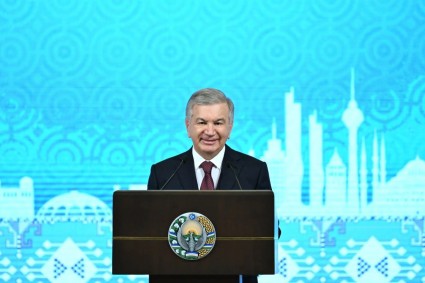Finance Minister Timur Ishmetov, at the second International Samarkand Economic Forum on Thursday, spoke about the conditions for maintaining high economy growth rates in Uzbekistan in the coming years.
According to the Uzbek Central Bank, by the end of 2022, Uzbekistan's GDP growth is expected between 5.2-5.8% (the previous forecast was 5-5.5%). In 2023, economic growth is forecasted at 4.5-5%, in 2024 - 5-6% and in 2025 - 6-6.5%.
“Indeed, at the beginning of the year we had quite a decent growth. When this crisis began, we had more modest forecasts. But what our experience has shown, if you look at previous years, for example, in 2020, when there was a COVID pandemic that continued into 2021, we found that the best way to solve all these problems is to continue our structural reforms,” he noted.
According to the minister, Uzbekistan now "does not have much fiscal space to do something without these reforms."
“Yes, three or four years ago we focused on borrowing. I would say that then the conditions in the world for this were good. We traditionally have a low level of debt to attract borrowing so that we can afford to rely on debt. In addition, all our partners and investors were ready to support. Now we are in a rather difficult phase. We can see that a global recession is coming, all [central banks] are tightening monetary policy, raising interest rates. And our borrowing [became] quite expensive, frankly,” he said.
Fiscal space - the possibilities of the state budget (including the possibility of borrowing), which allow it to provide or access resources to achieve the desired goal, while not endangering the stability of its financial position or the stability of the economy and without violating other restrictions created by its own national legislation or supranational authorities or creditors (especially large creditors such as the International Monetary Fund or the World Bank).
Timur Ishmetov noted that the global recession limits the government's financial spending and forces it to start creating its own financial buffers (reserves) in these conditions.
“So the only way is that we should focus on structural reforms that will actually lead to a reorientation of general economic policy towards the use of private money, and not our own fiscal space and not borrowing. In the near-medium term, we have to rely on private money - that's the only way," he said.
He acknowledged that these reforms will be much more difficult to implement due to the regional crisis and changes in investment sentiment that are not in a positive direction for the region as a whole.
“But even in these conditions, we must promote these reforms to make sure that it will be interesting for private investors to come to Uzbekistan and [invest]. We have a lot to do in terms of price liberalization in some areas, to transform the public sector in such a way that the private sector has an equal opportunity to compete in its field. And as a result, we must end [the transformation] with a very good privatization program and very good results,” the minister stressed.
If Uzbekistan continues these reforms, Timur Ishmetov is sure, the country will expect "quite decent growth" of the economy at the level of 5% and above.
“But we are more concerned about the next years – not 2023, but 2024 and 2025. If we continue these reforms, we will be able to maintain this growth. If we follow the scenario where we delay and procrastinate on reforms, then starting from the second and third years, it will be almost impossible to maintain this growth. The situation may be different for different countries, but today it is important for us to continue reforms that will ultimately guarantee the transition of the economy to private money, and not to state money. This is the only path we need to focus on,” he said.
The volume of Uzbekistan’s total external debt as of January 1, 2022 topped $39.6 billion, having increased by 2.3 times since 2018 ($17.2 billion). The country has repeatedly resorted to external borrowing, including issuing Eurobonds, however, in the current environment, when the central banks of the world are tightening monetary policy (raising interest rates), loans for states have also risen in price.
The unstable geopolitical situation in the world in the first quarter caused a slowdown in the attraction of borrowings by the public and private sectors, which caused the external debt to slightly decrease. At the same time, the government did not meet the limit on the state budget deficit due to high public spending and asked the deputies to increase the limit on the deficit.
The Central Bank noted that GDP growth in subsequent years would depend on the logical completion of structural reforms, the reduction of the role of the state in the economy, and other factors. From 2023, it is necessary to start putting public finances in order, the regulator pointed out, since due to the high budget deficit, inflation is forming above forecasts.















